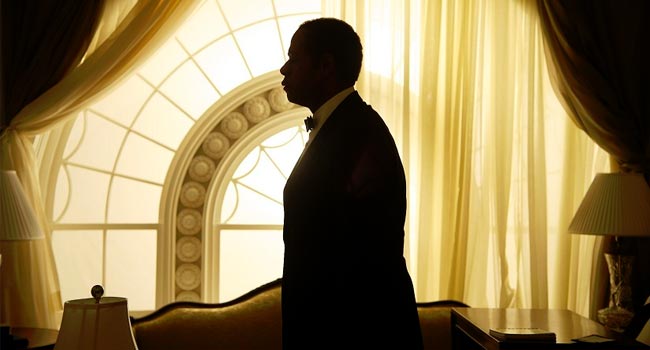
It’s a shame that the excellent central storyline gets so obstructed and mucked up by all the noise, spectacle, and pageantry.

It’s a shame that the excellent central storyline gets so obstructed and mucked up by all the noise, spectacle, and pageantry.
Lee Daniels’ The Butler is a chronicling of the civil rights movement through the eyes and ears of a black butler in the White House, based on a real man, Eugene Allen, who served 7 U.S. presidents from 1952 to 1986. Daniels and screenwriter Danny Strong (Game Change) take “dramatic liberties” with Allen’s personal life here, but the events that transpire in the White House are apparently true-to-life. The film stars Forest Whitaker as the titular servant.
As a historical drama, the film fumbles; it’s a cameo-parade that reduces some of the most interesting and socially significant people in our nation’s history to diminutive sound bites and fleeting, trivial (and inaccurate) caricatures. It’s a biopic (one of my very least favorite types of films) that looks and feels familiarly “Gump-y”, but without the exhilarating sense of narrative movement or unforgettable riffs on key historical moments (Strong’s riffs are woefully unremarkable). However, if you wipe away all of the spectacle, age make-up, presidential impressions, and on-the-head historical allegories, there’s an eloquent, affecting father-son tale that miraculously breathes life into a narratively encumbered film.
The film opens in the 1920’s Deep South with a jab to the heart; a gruesome image of the very worst consequence of post-slavery mentality that I am choosing not to describe in detail here, even though the image is tasteful and vital to the story. Cecil Gaines (Michael Rainey Jr.) is a young cotton picker who enjoys spending time in the fields with his father, but when his old man gives the plantation owner the tiniest bit of lip, he’s gunned down right in front of Cecil’s eyes. The boy is promoted to house worker by the covertly sympathetic Vanessa Redgrave, and over the next few decades sharpens his skills and works his way up to being one of the most respected and beloved butlers in the White House (he’s now played by Whitaker.) The climb from dank to swank is told through uninspired montage with a few emotional nuggets sprinkled in.

Within the white walls, Cecil serves a slew of presidents that are played by loud, well-known actors that can’t be disguised by any amount of makeup you pile on. Robin Williams (as Eisenhower), Alan Rickman (as Reagan), and John Cusack (Nixon) are so miscast and awkward that they’re guaranteed to jerk you right out of the movie and even make you laugh in bewilderment. Their presence is showy and hokey and not worth your time. On the other side of the coin, there’s Live Schreiber (as Johnson) and James Marsden (as Kennedy) who actually do a great job and disappear into their roles. Still, it feels like these appearances are doubly-distracting double cameos. “And now…John Cusack as Richard Nixon! Applaud! Laugh!” Cringe.
Though Cecil’s career is going swimmingly and he’s able to provide a cushy lifestyle for his wife Gloria (Oprah Winfrey) and two sons, Charlie (Elijah Kelley) and Louis (David Oyelowo), home life isn’t so peachy. Gloria, a stay-at-home mom, grows weary and neglected as Cecil is constantly caught up with his work at the White House. Louis, however, provides the most disruptive element to the family dynamic, as he becomes actively involved with the Freedom Riders and the Black Panthers, opposing the government his daddy serves, the same government that puts food on the table and gave him the house he grew up in.
This enrages Cecil (remember, he lost his father due to a transgression that’s tiny compared to Louis’.) Louis is fighting for civil rights aggressively, tooth and nail, while Cecil is quietly subverting black stereotypes by being a humble example of a great African-American man in the most influential building on earth (this observation is highlighted ham-fistedly in a scene between Oyelowo and Nelsan Ellis, as Martin Luther King Jr.) Cecil and Louis’ violently clashing views on how to foster change in the nation splits the family in two. Their opposing philosophies finally implode their relationship in wonderfully intense family dinner scene. Watching the father and son’s paths sharply diverge and then eventually meet again on the other side (in the current time of Obama) is the film’s one true joy.
Whitaker is so good here that he’ll often fool you into thinking you’re watching a great film. His range is staggering: he can smile the warmest smile you’ll ever see and make you feel safe, or he can stab you in the chest with a venomous glare. Likewise, all the main players (in contrast to the presidential cast) put forth strong performances, from Cuba Gooding Jr. and Lenny Kravitz as Whitaker’s ribbing, chummy fellow butlers, to Winfrey, who handles her morally complex role eftly here, though her character’s arc feels somewhat superfluous.
Like I said, as a historical drama, Lee Daniels’ The Butler falls flat (though the filmmakers’ intentions are pure and good.) However, as a family drama, there’s something to it; the well-acted inter-familial relationships are undeniably effective and the moving father-son storyline unfolds elegantly. It’s a shame that the excellent central storyline gets so obstructed and mucked up by all the noise, spectacle, and pageantry (and that god-awful Cusack performance that I can’t seem to shake off. Yuck.)